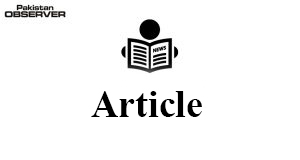M Hussain Hunarmal
IF anybody understands the longstanding Afghan conflict may find an end by the release of both side prisoners, he must review such utopian thought. Similarly, if an analyst imagines that Intra-Afghan talks will lead towards a lasting peace in the war-ridden country by holding merely one or two rounds of talks, he should also think again. Because this complicated issue needs much homework, time and long farsightedness. Firstly, I think rather than the main stakeholders (Afghan government and Afghan Taliban) the Afghan squabble can be settled by those external powers that are directly or indirectly involved in Afghan affairs from day one.
Every one of us knows that there is a time when the US had a soft spot for the Afghan Taliban who did establish their self-styled government in Afghanistan from 1996 to 2001. in the aftermath of 9 /11, the US suddenly changed its mind and had to replace the Taliban government by a so-called democratic setup overnight. Whether it was the Hamid Karzai led government in Afghanistan or the current setup of Ashraf Ghani is, both have been backed by the US since 2001.
Take for a while the current scenario of Afghan politics after the Doha Peace Accord struck between the US and the Afghan Taliban on 29 February this year. Following just twenty four hours of the accord, President Ashraf Ghani issued a rough statement saying “his government was not confined to free the Taliban detainees involved in crimes during the protracted Afghan conflict’’. But finally, the Trump Administration did convince President Ghani-led government to release Taliban prisoners in order to pave the way toward Intra-Afghan talks. However, Afghan government has freed at least 4500 Taliban detainees out of 5000 detainess. It illustrates that the reluctant Afghan government will soon release the remaining 400-500 Taliban prisoners who are said to be involved in heinous crimes.
Likewise, the Taliban, who has an undimmed history of the backing of Pakistan’s establishment, has not escaped Pakistani influence yet. This is indeed an unavoidable fact that both the US and Pakistan are struggling to arrange intra-Afghan dialogue table as soon as possible and both are in favour of a friendly Afghanistan where its interests are not risked in the future. In order to once again secure the upcoming US presidential polls scheduled in November, the Trump Administration has made its top priority to reduce its troops in Afghanistan and temporarily pose a shared setup through intra-Afghan talks.
It is also a reality that the United States can’t be expected to completely withdraw its troops from Afghanistan due to having multifaceted aims in the future. On the other hand Pakistan’s Establishment also does not want to leave a space in Afghanistan by disowning the Taliban that can be filled by India or its other rivals in the future. Pakistan will need a favourable Afghanistan where neither India could hatch conspiracies against her nor the Durand Line issue is resurfaced as did in the past. If intra-Afghan talks commence, their will be a tough task to draft a new constitution because Taliban who stood for the establishment of an Islamic state, will not be ready to accept a constitution which was drafted by there opponents what they call as the accomplices of the US.
At the beginning of dialogue process, the Taliban may also insist on the dissolution of the current democratic setup, which they have never called a legitimate and representative government of the country. By the same token, a series of demands will also be presented on the dialogue table by the government of Afghanistan. For instance: [The Taliban must convince the government and even the entire Afghan nation that they will cut off foreign ties in future as they had in the past] As well as the government may agree to partially amend the constitution but it will not be willing to replace the original name of the state by another name. In order to build a peaceful Afghanistan after a prolonged bloodshed and destruction, both stakeholders must put their egoism behind at this critical juncture and each side must place its demands on the dialogue table according to its volume.
—The writer is a professor at government degree college Zhob and a columnist.







